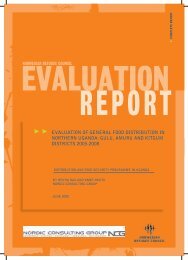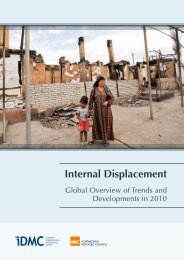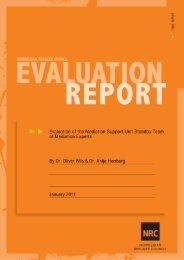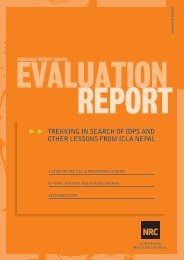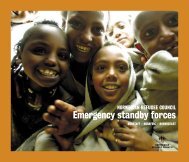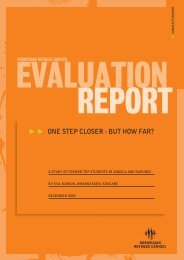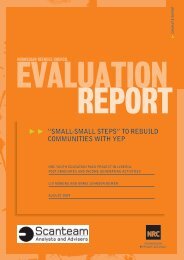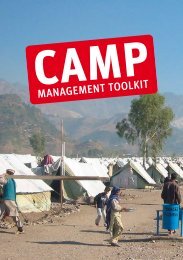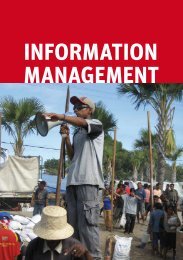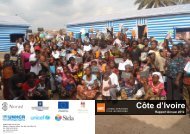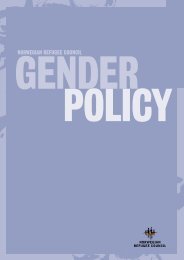NRC PROGRAMMES - Norwegian Refugee Council
NRC PROGRAMMES - Norwegian Refugee Council
NRC PROGRAMMES - Norwegian Refugee Council
You also want an ePaper? Increase the reach of your titles
YUMPU automatically turns print PDFs into web optimized ePapers that Google loves.
Information, counselling and legal assistance (icla)Information, counselling and legal assistance (icla)the host community or even of anotherdisplaced person. <strong>NRC</strong> will always lookfor alternative solutions to avoid creatingfurther displacement or vulnerability,such as mediation or other conciliatorymethods.Generally, ICLA activities imply a socialand institutional impact beyond the recipienttarget groups by promoting a rightsculture, influencing legislative process oradvancing reconciliation.PhasesThe nature of ICLA assistance will adaptto the situation on the ground. Given thesevere conditions affecting people in displacementit is imperative to maintain afocus on durable solutions from the earlyphases of a conflict. In such early stages,ICLA activities may be integrated withother activities such as camp managementor food distribution to achieve this. AnICLA component may be limited to providinginformation on the conditions in theareas of origin or to referring individualsto safe locations where they can receiveassistance.Congolese waiting their turn outside Registration OfficeApproach<strong>NRC</strong> assists persons displaced due to conflictto achieve durable solutions and toobtain their rights. Within this broaderframework, <strong>NRC</strong>’s activities on information,counselling and legal assistance (ICLA)are designed to provide assistance to IDPs,refugees and returnees to make free andinformed decisions. This is achievedthrough the provision of information andfree legal assistance to remove legal andother obstacles in their way to durablesolutions and enjoyment of their rights.Displaced persons often lack basic informationthat will enable them to make aninformed decision on whether to return,stay in the location of refuge or find a thirdplace where to settle. ICLA provides themwith accurate and credible information andcounselling to make such decision. Thefocus is on the conditions in their areas oforigin and on the legal or other obstaclesthey might face when returning. Whenlocal integration is an option, informationon their rights and the basic conditions forlocal integration is also delivered.<strong>Refugee</strong>s and IDPs face legal obstruction,abuse, discrimination or simply lack ofaction by governments. Often they do nothave access to protection mechanisms suchas administrative bodies, law enforcementofficials or courts. Access to housing andproperty, lack of legal identity and discriminationin accessing labour or educationrights constitute frequent legal obstacles todurable solutions. ICLA programmes assistthem to overcome these obstacles and toobtain an adequate response from theauthorities regarding their rights.Target groupsICLA primarily focuses on providing assistanceto refugees, IDP’s and returnees.Within these groups ICLA will pay particularattention to vulnerable individuals orgroups, such as female heads of household,victims of sexual and gender based violence,children, elderly, minorities and indigenouspeoples.ICLA assistance can also extend to hostpopulations to prevent perceptions ofdiscrimination or bias which may end inhostile attitudes towards those displaced.For example, <strong>NRC</strong> provides legal assistancein disputes over land and property whichmay result in the eviction of a member ofHowever, ICLA is more significant in postconflictand recovery phases when the likelihoodof further displacement decreasesand opportunities for durable solutions aremore likely. Legal assistance may require along term presence in a country beforelegal authority, whether formal orcustomary, is restored.Working PrinciplesIn addition to the principles establishedby <strong>NRC</strong>’s mandate and code of conduct,ICLA is grounded on a human rights basedapproach. It represents an applied (versusa normative) approach to human rightswork. It is possible to identify componentsof human rights and refugee conventionsin the different components of ICLA:ICLA aims to protect people from discriminationfor reasons related to theirdisplacement;Afghan refugee with newly acquired property documentation.24 <strong>NRC</strong> CORE ACTIVITIES <strong>NRC</strong> CORE ACTIVITIES 25




